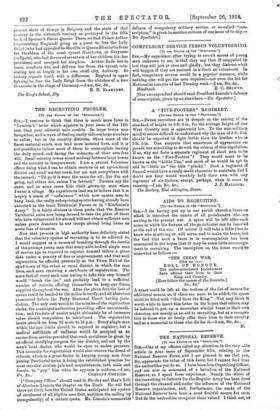THE RECRUITING PROBLEM.
[TO THE EDITOR 07 THE "SPECTATOR."]
SIR,—I venture to think that there is much more force in "Lambda's" letter which appears in your issue of the 12th inst. than your editorial note credits. In large towns men foregather, and a wave of feeling easily induces large numbers to enlist ; but in the country districts, where some of the finest material exists, men lead more isolated lives, and it is not possible to induce most of them to contemplate leaving the daily round and facing the unknown of their own free will. Small country towns stand midway between large towns and the country in temperament. I am a retired Volunteer officer doing what I can to obtain recruits in an agricultural district and small market town, but am met everywhere with the remark : "I'd go if it were the same for all; but I'm not going, and others not, unless I'm fetched." Parents say the same, and in some cases hide their grown-up eons when I enter a village. My experiences lead me to believe that it is largely a sense of " unfairness " which now causes men to bang back, the really enterprising spirits having already been absorbed in the local Territorial Forces or in " Kitchener's Army." It is fairly obvious in these parts that the Reserve Territorial units now being formed to take the place of those who have volunteered for abroad will not obtain sufficient men unless grave disasters to our troops abroad bring home an acute fear of invasion.
Now that persons in high authority have definitely stated that the voluntary system of recruiting is to be adhered to, I would suggest as a means of breaking through the inertia of the average young man that every able-bodied single man of service age be required to register himself before a given date under a penalty of fine or imprisonment, and that such registration be effected personally at the Town Hall of the chief town of the urban or rural district in which the man lives, each man receiving a certificate of registration. The mere fact of every such man having to take this step himself would "break the ice," and probably lead to a sufficient number of recruits offering themselves to keep our forces supplied throughout the war. After the given date the lists of names could be handed to the police to verify, and all absentees prosecuted before the Petty Sessional Court having juris- diction. The only cost would be the salaries of the registration clerks, the municipal authorities providing office accommoda- tion; and the lists of names might ultimately be of immense value should compulsion be introduced. The registration hours should be from 12 noon to 10 p.m. Every single man within the age limits should be required to register ; but a medical certificate of unfitness would be accepted as an excuse from service provided that such certificate be given by an official certifying surgeon for the district, and not by the man's local doctor, who would be open to undue pressure. This necessity for registration would also remove the dread of ridicule, which is a great factor in keeping young men from joining Territorial units, it being the established practice for most recruits' civilian pals and acquaintances, both male and female, to "guy" him when he appears in uniform.—I am, [" Company Officer" should read in Nicolay and Hay's Life of Abraham Lincoln the chapter on the Draft. He will find there set forth how the United States anticipated his system of enrolment of all eligible men first, and then the calling up (compulsorily) of a certain quota. Mr. Lincoln's memorable defence of compulsory military service, or so-called "con- scription," is given in another column of our issue of to-day.- ED. Spectator.]


































 Previous page
Previous page